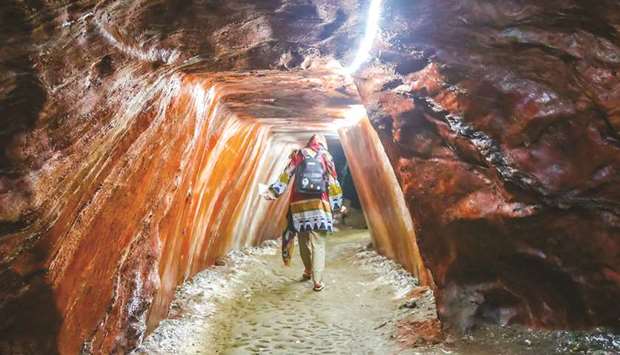The Khewra Salt Mines, as they are called, are located about 160 kilometres south of Pakistani capital Islamabad, at the foothills of the Salt Range to the north of the Jhelum city of Pind Dadan Khan.
The mines are considered the oldest in the salt mining history of the sub-continent.
With 98 per cent purity, the salt production in 2018 was estimated at 389,134 tonnes per annum. Besides the revenue the production brings in, a handsome amount is earned via the 40,000-plus tourists which visit the site each month.
The mines are not only visited by locals but also by international tourists, bloggers and vloggers.
“For me the mines were an incredible experience. I have never seen such beautiful monuments made just from salt before. We get Himalayan rock salt in the UK, so to go and visit where it’s made was so much fun and I think this is particularly true for international visitors,” TV presenter and travel blogger Alex Outhwaite said after a visit to the mines.
She added that it was also interesting learning about the use of salt treatments for health as that was something not focused on in England.
Among the tourists, a large number of them are students from different schools, colleges and universities who enjoy visiting the site as well as see the mines firsthand after reading about them in books.
“It was absolutely strange for me when I entered the mines in an electric train and saw long tunnels made of salt. I have studied about them in my course books and did not think them so interesting and beautiful at the time. It is spectacular to see brightly coloured monuments made of red, yellow and pink salt,” said Bushra Ali, a university student who visited the mines with a group.
Walking inside the mines the visitors come across marvels such as a mosque, a model of Minar-e-Pakistan (a national monument in Lahore where the resolution for an independent state for Muslims of the Indian subcontinent was passed on March 23, 1940, and which led to the country’s creation seven years later), a dispensary, Chaghi mountain (in Balochistan province) and some other colourful buildings all made up of salt bricks. The monuments glow with lights inside them.
“I enjoyed the beautiful glowing structures made of salt bricks but the best spot in the mines was Crystal Palace which was amazingly beautiful with salt crystals sparkling like diamonds all around. It was like a dream spot for me,” said Abeera Fazal, a visitor from Peshawar.
The dazzling Sheesh Mahal, or the Palace of Mirrors, is another attraction in the mines with walls made of transparent salt and water ponds illuminated with colourful bulbs. The illuminated ponds and chambers have been connected with bridges made of salt.
“When I entered Sheesh Mahal, I felt like I’ve entered some scenes of Alif Laila (fabled One Thousand and One Nights) drama series which I watched in my childhood,” said Ahmad Ali, another visitor from Lahore.
An enthralling pond with Christmas trees is another wonder designed in the mines.
“Room and pillar mining method is used to extract salt from the mines. The salt in Khewra is the best in the world which is found in three different colours, white, red and pink,” Fayaz Hussain, a tourist guide, explained.
Apart from high quality salt, Khewra is also famous for gypsum, limestone, lime clay, potash, coal and other minerals.
Local residents feel pride that they live nearby the world’s second largest salt mines that are also a famous tourist spot.
“We are happy to have the opportunity to see this geological wonder where thousands of tourists come,” Haji Zafar Ahmad Reehan, an 80-year-old resident of Khewra who is also a salt dealer, said, adding that tourism brought several benefits to the local residents including restaurant owners, shopkeepers, transporters and gift shops owners, who sell salt-made souvenirs.
According to official records, a total of 419,379 tourists visited the Khewra mines in the year 2018-19, including 488,928 Pakistani visitors and 2,411 international tourists.
“This year the inflow of tourists has seen over 20 per cent increase as compared to 2017-18. This is because of peace in the country and steps taken by the present government for the promotion of tourism,” said Abdul Hafiz, who is an office assistant in Khewra tourist resort run by the Pakistan Mineral Development Corporation.
However, tourism experts and tourists expressed concern over the dilapidated condition of the road from Lila interchange to Khewra town, saying that the government should ensure the provision of facilities for tourists.
“In the past, a special train was started from Rawal Pindi to Khewra mines with stops in Lala Musa and Malak Khel. The train would arrive in Khewra at 11am and depart at 4pm for Rawalpindi daily. It was a good initiative by the government as large number of tourists used it but unfortunately, this government stopped the train,” said Munir Ahmad a local resident of Khewra, and expressed the hope that it would resume the operation of the train.
Cleanliness is another issue. Tourist guide Hussain complained that visitors did not care about cleanliness and threw trash and plastic bottles everywhere.
“Look at the plastic bottles in the ponds, they have been thrown by the visitors. Sometimes visitors make loud noises as well which is also not good,” he said. —Internews

JOURNEY: A tourist walks around a salt cave inside the Khewra Salt Mines.
